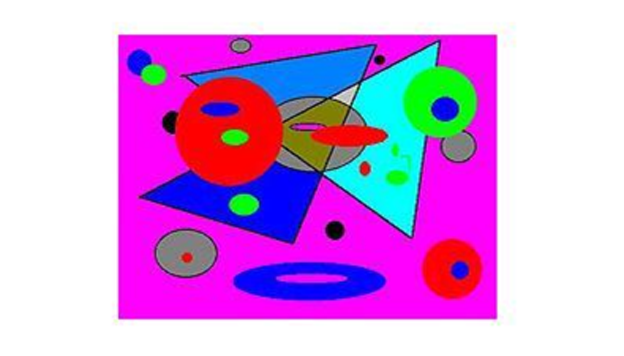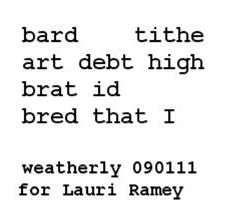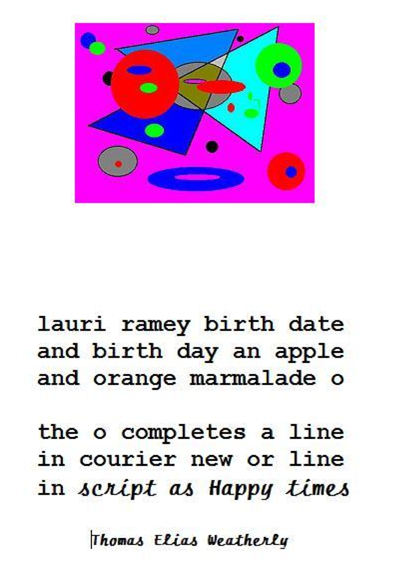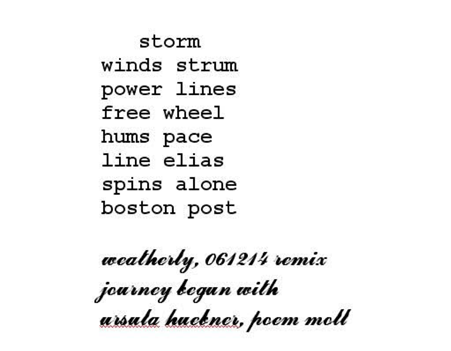Emails to Lauri Scheyer (Ramey), 2005–2014

Note: Below are excerpts from four emails written to Lauri Scheyer (Ramey) between 2005 and 2014, including reflections on Weatherly’s writing process, friends and enemies, family, aging, poetic form, teaching, and first arrival in New York (during which “I rewrote [Allen Ginsberg’s] Howl; Kaddish a great poem didn’t need revision”). Sometimes it feels as if we heard in these emails a speaking voice, fragments of an ongoing conversation constructed of anecdote, reminiscence, description, opinion. What comes through above all is Weatherly’s combination of deep reading and knowledge of poetic tradition with a refusal to be pontificate from any sort of ivory tower, to hold strong opinions but never be close-minded. As Weatherly puts it here, “If I have a canon name it haphazard.” Also included are three “birthdate poems.” — David Grundy



[December 21, 2005]
Ms Ramey,
Merry christmas, happy chanukah, happy Kwanza, merry whatever you celebrate.
I am waiting for the anthology. I am waiting for two books, your anthology and my new book, short history of the saxophone (Groundwater Press). I hoped to have one of them for the holidays. I cop out and give books as presents; although I do not like to receive too many of them. I discovered just before I moved from NYC to Huntsville, Alabama, that I had over five thousand books. I got rid of most of them, about three thousand. Some were easy. I gave the sets of encyclopedia to friends with children, sold the mysteries to a mystery bookstore, the history to history bookstores, etc. Admonition: don’t collect books. I was not a collector. I just kept too many, bought too many, and didn’t sell or give them away. I know why we have libraries now.
Curiosity about what you say in the critical introduction, the poets in the anthology, about you, and your co-editor, compels this intrusion. Forgive it. Please give my email address to Mr Nielsen. I read the few articles about me, about my work; I don’t recognize me. I don’t recognize my friends from their articles. I spent too many years out of the communities of poets and other literary folk. Perhaps that is the reason. I co-edited Natural Process (Hill and Wang) a couple of decades ago; although doing it I sold out. I had a wife and infant. The money was tempting. I wanted to do a non-racial anthology, but that wasn’t the market. I feel that my work is American not African American, even if the latter is folk perceive. In 1947 A.B. Guthrie, Jr’s Big Sky was published; he should have won the Pulitzer. He didn’t. I believe Robert Penn Warren did. Well, more than one critic believed that A.B.G. deserved it. I do too. It was considered genre fiction, not mainstream. They gave Guthrie one in 1950 for The Way West. I believe out of guilt for ignoring Big Sky. African American is still not considered part of the mainline; it is a sidetrack in the American poem world. Same with novel; same with any art. I am, was, a part of this unconscious conspiracy. One of the reasons that this present book of mine is first since Thumbprint (Telegraph Books). And I don’t socialize with enough poets. I didn’t go to writer retreats, conferences, consciously join movements, or, as my last wife urged me to do, promote myself much. She did; she still does. My ex is an agent and is brainwashed about me because she read my work when she was a kid. She may be right. I should expose myself more. I spend most of my time learning how to write poems.
to make poems
never write alone
never write poems
never moans about
these means to it
meant[1]
I will learn how one day before I die; I have good influences.
“His grandparents, Sippie Wallace and Jimmy Rogers, and Hilda Doolittle and Wallace Stevens, are special influences. All other details are spurious history, lies, Juvenalian delinquency, and rumor.”
Forgive my curiosity. Who are you and why?
I may be exposing myself to danger by asking, but what the heck.
Shalom,
Weatherly
[September 11, 2011]
Sit look out from my apartment Seventh Avenue & 12th St. Done lot of travel these last 3 months. A first cuz once removed wedded in Barbados, reception a Port Jefferson Country Club, Long Island, NY; back to Huntsville, AL; then here, the Village, again to supervise floors waxed in my apartment. In between couple weeks with my grands in Marietta. My lady just got back from 6 months in Berlin, number 2 daughter had second baby; Ursula stayed to help out. The two of us have four: Ursula has son, EMS in Seattle, WA; her daughter a MD in Berlin; I have a son, manages an electronics store in N. Calif; and daughter, mathematician and engineer in Marietta, GA. We together have five grands: Ursula’s son has a daughter, nine, and her daughter has a son and daughter; my daughter has fraternal twin gals.
So you see what folk who dont have 9 to 5s do. Ursula is a pediatrician. Artists should always married folk with non artsy jobs.
Tuesday I take a train back to ’bama. I love rail travel. My grandpa was a member of the Brotherhood of Sleeping Car Porters, so I rode free as a kid.
Bicycle and rail are best ways to travel. Rail is civilized
Peace,
[June 23, 2014]
[…] (Some you know me as hippie, or some other cranky counterculture, yet you who really know me know I’m just a plain old nerd.)
Sometimes I overwrite include explanation or intro lines and stanzas. This happened with ‘storm’. My doing not Ursula’s; she began the removal; I continue the removal until we get to the core, the real one.[2] Its coil like that rattlesnake lightning. The trucks and other traffic may sound good dont belong here. I will explain one image: a Pace Line, a group of riders in a line so rider in front breaks the wind each one takes a turn in front; a pace line moves much faster than one rider.

storm
winds strum
power lines
free wheel
hums
pace
line elias
spins alone
boston post[3]
Storm
You crash over the trees,
you crack the live branch--
the branch is white,
the green crushed,
each leaf is rent like split wood.
You burden the trees
with black drops,
you swirl and crash —
you have broken off a weighted leaf
in the wind,
it is hurled out,
whirls up and sinks,
a green stone.
H.D.[4]
My revision:
You crash over trees,
you crack live branch —
the branch white,
the green crushed,
each leaf rent like split wood.
You burden trees
with black drops,
you swirl and crash —
you break off a weighted leaf
in the wind,
it hurled out,
whirls up and sinks,
a green stone.
Of course I stand on the work of HD and other masters of verse and prose poems; I have the advantage of hind sight, their foresight.
HD would have eventually done a Marianne Moore, I believe, yes, John, on her poems and revised them. I only did what I channel and I dont mean hocus pocus, but a highjackleg learned hypothesis of what she’d do. Yeah, Zan, I know.
Some of the first acts I committed when I went to New York City, at St Mark’s Poetry Project, was to revise poems of my heroes and villains list. I rewrote Howl; Kaddish a great poem didn’t need revision. I rewrote some poems of Ashbery, Creeley, Levertov, Waskowski, Jones, and many others, including some of the best poets of the beginning of 20th C, H.D., Chuck Berry, Jerry Leiber, Mike Stoller, Willie Dixon and Wallace Stevens to name a few. Twentieth C was a glory time for poets; the 21st more a silver than a gold age. The latter because poets now, some naturally good, are ignorant. They begin with the 20th and 21st C instead of at least the Anglo Saxon period. Even a beginning with the Elizabethan period would prepare poets better; it was one of the golder ages of our tradition.
[July 4, 2014]
Lauri Ramey,
Question away. My age gotta keep the brain busy or it becomes less efficient. I invite questions about anything; although my favorites in the eclectic mix of things I follow, human powered vehicles - I considered wheelchair once, but friends said folk who had to use them would not like that, human action, and poems. I recognize the redundancy somewhat in the last two.
Smart, accomplished, and pretty young woman and cranky, old, sometimes strange, sometimes deliberately and calculatingly strange. Who gets best of this. And you’ve read some of my poems. Yep!
I have to remember sometimes I have cable tv. I’d rather read poems aloud; only good way to do it.
Got two, no three books recently. John [Ashbery] sent me his recent books
Collected French Translations: Poetry, edited by Rosanne Wasserman and Eugene Richie (2014)[and] Collected French Translations: Prose, Edited by Rosanne Wasserman and Eugene Richie (2014) (Disclosure: Wasserman and Richie, my publishers at Groundwater Press; I met them in Ignatow’s seminar, Columbia’s graduate writing program. Ashbery and I old friends and enemies; he use to say nasties about HD and I’d accuse him of being a bad painter with a lame French accent.)
I studied French in high school. Remember less of it as years and decades pass. Don’t like much of it. Remember my limits. Wonder the pull of it on some folk. English healthiest language for poem smithery. Think of foreign poets who move here or britain, switch to english. I tire of the so called musical sound in french.
I may write review on one of my often unread blogs. Folk say I dont promote them. I dont, I guess. I didn’t believe I’d publish until after 40. First one in 70th. Maumau American Cantos not a good book; I’ve rewritten half dozen so far. These poems moved through Oppenheimer’s workshop at St Mark’s unscathed. They needed a scathe. Do you have access to a copy of Maumau American Cantos, Corinth Books, 1070. Compare the remix to the original.[5]
And third book, Ordinary Words by Ruth Stone, Paris Press, Ashfield, Ma, 1999, sent to me by former student. My students send me books.
(My agent in the past has sent me money. Suppose to make money for her. She believes folk barbarians for not exalting my work. She doesn’t understand capitalism and the Canons. My students exalt me. Dont know whether I taught them or brainwashed. Feels good though. I’m happy most my latest and I revise the old, or discard ones not in public.)
Seems many women students, some men too, liked her work. So did I probably for some additional, some different, from women. One thing I liked, she expanded sound patterns to, near, and on the boundary the human brain can hear. Often her music delicate with hard fact.
My daughters are getting on.
They’re in over their hips,
over their stretch marks.
Their debts are rising
and their faces are serious.
(THE WAYS OF DAUGHTERS)[6]
May have noticed some my isms about poems.
I try to avoid the verb to be any form. I distrust english majors. I trust a few. I learned poems and prosody away from the canons, away from english majors. Still do, almost. Still too many english teachers teach influences, touch superficially on the construction of poems. Some continue to hold dear the idea of inspiration, the superstition, which replace the muses with the Abrahamic, Judaic, Christian, Islamic etc concept of deity.
I do in a sense; can’t deny the universe which creates us may tend us toward word music before we become worm music.
Consider titles of John’s books, Poetry, Prose. English majors teach children about poetry and prose, teach them wrong information.
Fact: Poetry, poem, a genre as novel, play, and essay differs from Prose, a mode of writing. Two modes in english, prose and verse. Say poetry and prose, so say say woman and doctor. If, say Poetry and Prose existed in same category — taxonomy important — that would make prose a genre instead of a mode of writing, or that would make poetry a mode of writing.
Prose and Verse modes of writing; may write poems, novels, essays, and plays in either. Only two ways write in english, verse, count syllables in some way (accentual, syllabic, accentual syllabic), or prose, dont employ count of syllables.
My litmus test for folk; not my belief, fact of the language.
Verse. … It is employed first (and best) of writing in general as opposed to prose; … Historical Manual of English Prosody, George Saintsbury, (first published in 1910), First Schocken edition 1966, USA
Economists must read Samuelson and Marx; biologists must read Origin of the Species; and these and every field has one, two, three must reads. English majors must read Saintsbury.
My pa taught at Alabama A and M College (now university) and librarians gave me stack privileges. I was nine when it began. I’d spend days in the poetry section, read anthologies, find poems I liked, find books by the author, read them, and read criticism, linguistics, prosody.
If I have a canon name it haphazard.
I adore librarians. Next I adore (shhh) english majors expert in poets I like. When I taught I requested office near those experts, often neglected, I lived and breathed their perfect audience.
I like poems. I belief everyone should write ’em.
Few folk here to talk to who’d share the delight and seriousness.
peace,
1. “to make poems” is from from short history of the saxophone.
2. Ursula Huebner-Bromberger, Weatherly’s then-partner.
3. Weatherly is here discussing the poem “storm,” printed in short history of the saxophone in a different version again from those provided in this email:
storm
lightning flashes thunders
tractor trailer rumbles past
winds strum
power lines
free wheel
hums pace
line elias
spins alone
boston post
4. H.D., “Storm,” in Sea Garden (London: Constable and Company, 1916), 36.
5. See the remix of “confederate cemetery” included in Uncollected Later Poems (2010–2014).
6. Ruth Stone, Ordinary Words (Ashfield, MA: Paris Press, 1999).
Edited by David Grundy